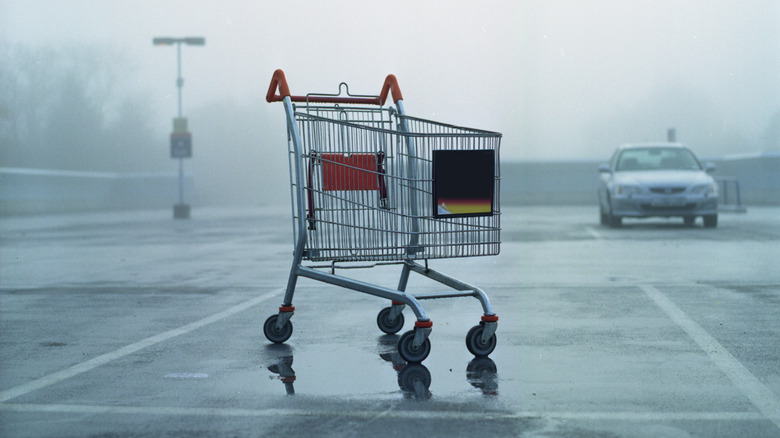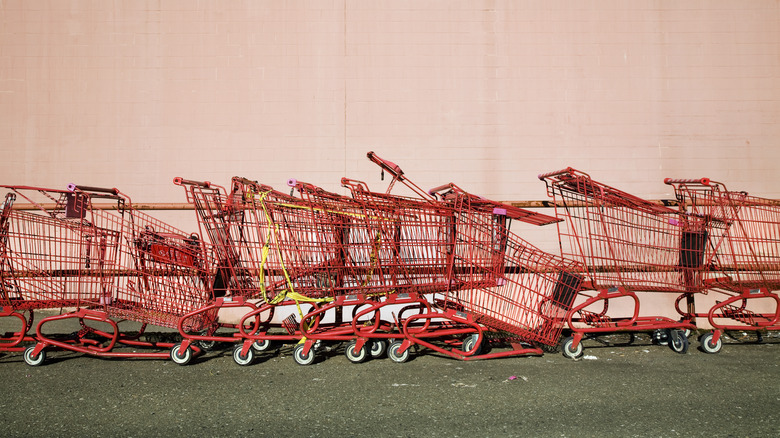What Science Has To Say About Why People Don't Return Their Shopping Carts
Are you a good person or a bad person? The answer might seem complex, but according to many on the internet, it's as simple as whether or not you return your shopping cart at the store. "The Shopping Cart Theory" is a term first coined in a 4chan post from May 8, 2020, and it quickly spread to memes across the internet, generating thousands of social media posts. It proposes that a person's ability to self-govern can be determined based on whether or not they return their shopping carts. Since there is neither a reward for returning the cart or a punishment for failing to do so, the only reason to return it is out of the good of one's own heart.
The Shopping Cart Theory provides ample fodder for scientists curious about human behavior (or maybe looking for topics for ethics research papers). In fact, anthropologist Krystal D'Costa wrote a piece on the matter for Scientific American back in 2017, three years before the theory blew up online. Although there is only one reason to return your cart — a desire to see order maintained — D'Costa identifies many reasons for cart abandonments. Some people may not return their cart because they aren't near a receptacle, they have a child that they don't want to leave in the car, or they think that it is a store employee's job to collect them. Whatever the reason, their choice has ramifications that reach far beyond what they'd imagine.
What kind of shopping cart user are you?
Krystal D'Costa argues that shoppers can actually be placed into five distinct groups. There are the returners, who always return their carts no matter what, and the never returners, their opposites. There are convenience returners, who return the carts only if they are parked close to a receptacle, and pressure returners, who return their carts only if an attendant is watching them. Last are the child-driven returners, who return their carts as part of a game with their kids (because who didn't love riding the cart as a kid?).
In this model, only the returners fall on the good side of the Shopping Cart Theory. The convenience returners, pressure returners, and child-driven returners are all influenced by an outside factor, proving that they are indeed dependent on some degree of external governance.
Both the Scientific American article and subsequent posts about the Shopping Cart Theory met some backlash on social media, particularly from parents who stated that they refused to return shopping carts out of fear of abandoning their child in the car. After all, it's not like behavior should be a sign of a Machiavellian personality. However, as D'Costa points out with her child-driven returner group, many people also use the child as extra motivation to return the cart, turning into a game of sorts.
Abandoning a shopping cart can trigger a butterfly effect
Failing to return a shopping cart may seem like an inconsequential choice. After all, there are no direct rewards or punishments for returning your cart. However, there is a fine line between minor inconvenience and major annoyance, and around the world, some actions are being taken to thwart shopping cart abandoners. The grocery chain Aldi makes customers pay for shopping carts, a deposit they can get back only if they return the cart when they're done shopping. Meanwhile, laws have been placed in multiple municipalities around the country, which fine individuals and businesses for abandoning shopping carts off property or in handicapped parking zones. There have also been vigilante efforts to curb the offense, such as the YouTube channel Cart Narcs, which catches cart abandoners on hidden cameras.
There's more to the picture here than just a few stray carts. Research shows that small acts of disorderly behavior can start a butterfly effect, leading to more widespread issues. In a study published in Science in 2008, researchers placed flyers on cars in a parking lot where there were stray shopping carts around and found that 58% of people threw the flyers on the ground, apparently unconcerned with the reasons why littering is harmful. When the researchers recreated the same experiment in a lot where all of the shopping carts had been placed in their proper receptacles, only 30% of people littered. Our actions, no matter how small, set an example for others, and the Shopping Cart Theory should remind us of that.


